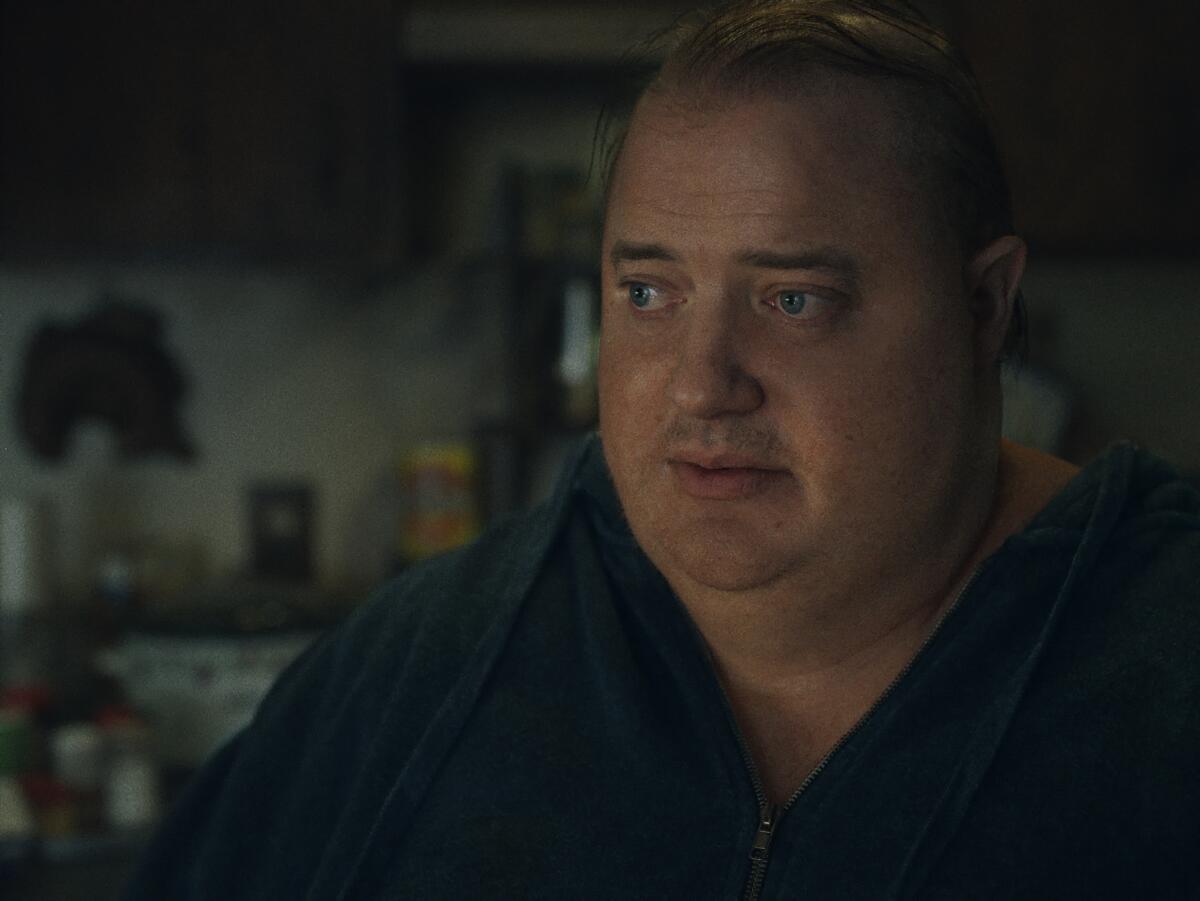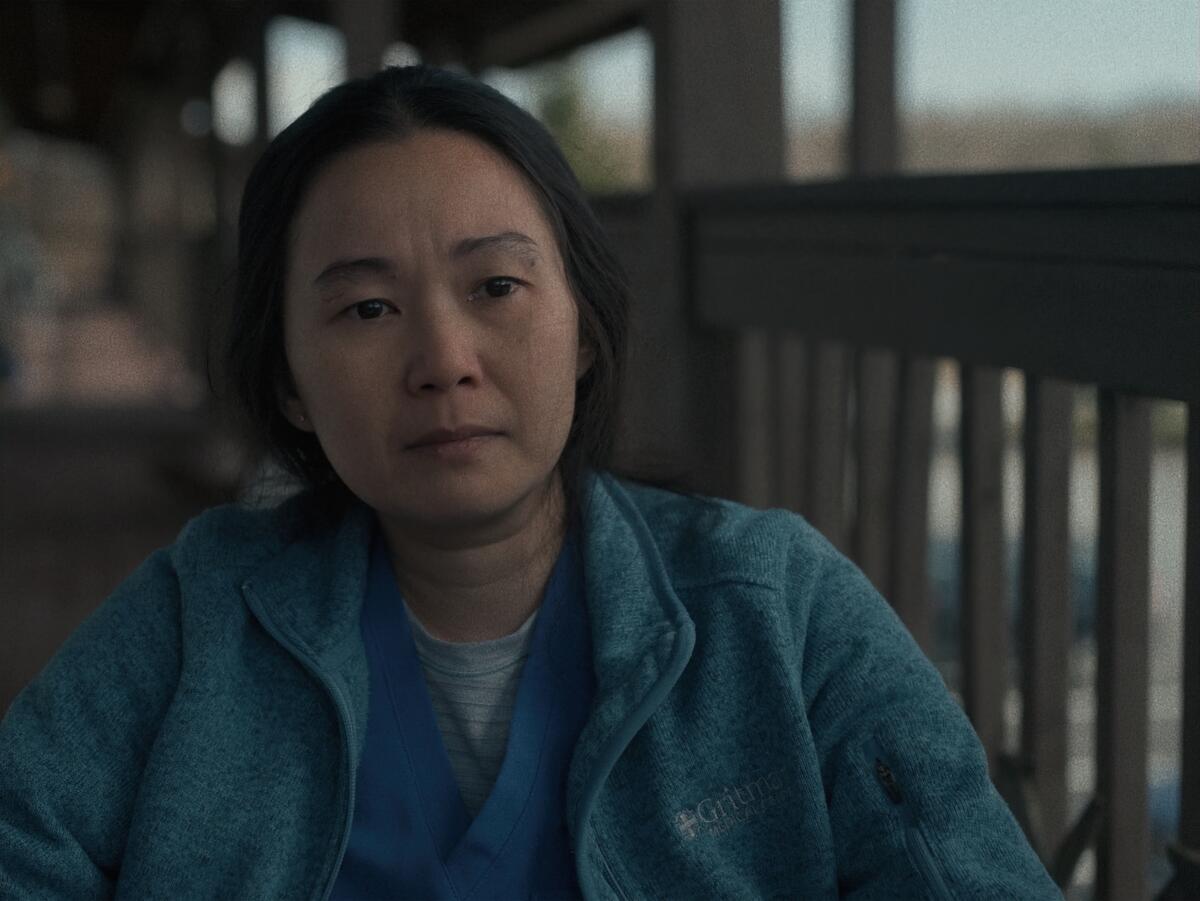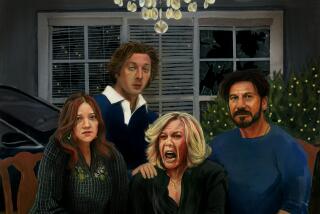Review: Does Brendan Fraser give a great performance in ‘The Whale’? It’s complicated.

When the camera looks at Brendan Fraser in “The Whale,” what does it see? It sees a man named Charlie who weighs 600 pounds and is slowly expiring from congestive heart failure in a drab Idaho apartment. It also sees a familiar Hollywood face attached to a most unfamiliar body, enacting the kind of dramatic, prosthetically enabled transformation the movie industry likes to slobber over.
You might find these two images to be of a piece — an intuitive fusion of performer and role that reaches for, and sometimes achieves, a state of transcendent emotion. Or you may find them grotesquely at odds: the character whose every groan, wheeze and choking fit means to inspire both empathy and revulsion, and the actor whose sweaty dramatic exertions are calculated to elicit praise and applause.
Let’s render that praise where it’s due. There is more to Fraser’s performance than his exertions, just as there is more to Charlie than the corporeal shock value that the movie frontloads him with: The opening scenes find him frenziedly masturbating to gay pornography on his couch, then doubling over with searing chest pains. It’s a lot for an actor to come down from, but in a grueling chamber piece that tends to wield a dramaturgical cudgel, Fraser attempts, and mostly achieves, a symphony of surprising grace notes. He shows us Charlie’s suffering, but also his sweetness; his grief, but also his good humor.
For your safety
The Times is committed to reviewing theatrical film releases during the COVID-19 pandemic. Because moviegoing carries risks during this time, we remind readers to follow health and safety guidelines as outlined by the CDC and local health officials.
He laughs easily, though also with great difficulty. He can mope and rant, but caught at the right moment, he’s an out-and-out charmer, a patient listener, a good storyteller. He teaches an online college writing class, hiding his obese frame from his students (his webcam’s broken, he tells them), but giving full voice to his love for words, his keen understanding of the pleasures and potential manipulations of language. His favorite piece of writing is an essay on Moby-Dick — the actual whale of the title — that he often reads or demands that someone read to him, a device whose ludicrous backstory Fraser just about makes convincing. And after a while, as doors slam, tension mounts and Rob Simonsen’s score broods and surges, you might feel a curious tingle of recognition. Charlie, after all, is a character in a Darren Aronofsky movie, which means he’s destined for a crucible of suffering that, however emotional and spiritual in nature, exacts its most grievous torments in the flesh.
That’s not to suggest that he is kin to the tortured performers of “The Wrestler” and “Black Swan,” who pushed their athleticism to brutish extremes, or the strung-out kids from “Requiem for a Dream,” even if Charlie knows the pain of a different kind of addiction. The differences extend beyond the fact that Charlie is mostly immobilized, only occasionally rising from his couch to stumble, with a walker, toward the fridge or the bathroom. (At times the camera, wielded by Aronofsky’s regular collaborator Matthew Libatique, almost seems to mock Charlie, moving around him with an ease and agility that he cannot muster.) There’s also the fact that, in contrast with most Aronofsky characters, Charlie is born of another writer’s imagination: Like more than a few studies in confinement, “The Whale” is based on a play, this one written and adapted for the screen by Samuel D. Hunter.
But while we may be confined with Charlie, we are not alone with him. “The Whale,” straining to both honor and break free of its source material, unfolds over a few consecutive days, during which Charlie receives a series of visitors. Their regular appearances at once modulate the drama and expose its artificiality, none more obviously than Thomas (Ty Simpkins), an earnest young Christian missionary who turns up at Charlie’s door at a seemingly opportune moment. He’s there to save this man’s soul, and also to facilitate a load of exposition concerning Charlie’s late partner, Alan, whose untimely death hastened his own downward spiral. Thomas is also there to annoy Charlie’s tough-loving best friend, Liz (a wonderful Hong Chau), a nurse who stops by daily to bring him food, check his vitals and nag him to take better care of himself. She knows that Charlie doesn’t need religion; he needs to go to the hospital.

But Charlie refuses, citing a lack of health insurance and the general hopelessness of his cause. Which doesn’t mean he has nothing to live for, judging by his concerted recent renewal of ties with his 17-year-old daughter, Ellie (Sadie Sink). Almost nine years ago, Charlie abandoned Ellie and her mother, Mary (a briefly seen Samantha Morton), to be with Alan. The teenager who now sits before him is more than a resentful child; she’s the personification of spite, vindictive and verbally abusive. Sink’s emotional ferocity is impressive, but Ellie, as written, amounts to one angry note struck with relentless, ultimately misapplied force. As a character, she’s about as subtle as the ultra-dim lighting — not just realistically dim but fastidiously, oppressively dim — that suffuses Charlie’s apartment, an all-too-literal embodiment of his inner darkness.
“You’d be disgusting even if you weren’t this fat,” Ellie snarls at the man she refuses to acknowledge as her father. And her ugly words find a painful echo in the question that Charlie at one point asks Thomas: “Do you find me disgusting?” It’s a question the camera seems to foist in turn upon the viewer, most emphatically when it shows us Charlie, in a miserable fury, devouring and vomiting up an entire pizza. It’s unsurprisingly unpleasant to watch, not least because Aronofsky seems to be shoving the camera in Charlie’s face with one hand while wagging his finger at us with the other. His question might prompt your own: Is this raw, unvarnished scrutiny of a difficult subject tilting into exaggeration, even exploitation? If we’re disgusted by what Aronofsky shows us, is that our fault or his?
Or is it Fraser’s? I’m reluctant to suggest it, and not just because I’m as fond as anyone of an appealing, long-underappreciated actor returning to prominence, after several years’ absence, in the industry that made, broke and allegedly abused him. But I’m also reluctant to fall into the default critical pattern of lauding an actor for what works about a movie or a performance and blaming a filmmaker for everything that doesn’t, especially since it just feels a little too easy. Movie performances are often more collaborative achievements than we (or actors themselves) care to admit, and a performance as reliant on external wizardry as Fraser’s — on the strange, seamless alchemy that welds an actor’s expressive tools to an array of digital and prosthetic tricks — doesn’t come into being without a director’s firm hand at the wheel. What’s good and bad about the performance is surely the responsibility of actor and director both.

The movie’s crudest moments, the ones in which Charlie’s body is treated as not just a matter-of-fact physical reality but a dare-you-to-look-away spectacle, have already raised legitimate questions and accusations of fatphobia — a debate that tends to arise whenever a Hollywood actor packs on some artificial pounds. Often this kind of transformation is done for comically villainous effect, whether it’s Colin Farrell’s Penguin in “The Batman” or Emma Thompson’s imposingly evil Miss Trunchbull in “Roald Dahl’s Matilda the Musical.” But do these prosthetic encumbrances feel more or less cheap when applied to someone like Charlie, who isn’t a violent caricature but a sympathetically drawn human being? Is the grindingly self-conscious realism of a movie like “The Whale” a more empathetic gesture or a crueler, uglier one?
To return to the question at the outset: When the camera looks at Brendan Fraser in “The Whale,” what does it see? I think it sees a good actor giving a well-meaning, unevenly directed and often touching performance in a movie that strives to wrest something raw and truthful from a story that’s all bald contrivances, technological as well as melodramatic. But if “The Whale” is a weird conflation of the unflinchingly honest and the unbearably phony, Charlie’s own sincerity is undeniable: “Tell me the truth,” he says and reiterates on multiple occasions, whether he’s urging his students to write from the gut or engaging Thomas in a genial theological debate. As he demonstrated in his recent “Noah” and “mother!,” Aronofsky is a skeptic who’s more willing than most to meet God halfway.
And God, in this movie, surely has a lot to answer for: hypocrisy, homophobia, depression and suicidal ideation, for starters. But if we can think of God as synonymous with goodness, and I think we can, then he also seems to turn up more often than expected — not just when Thomas comes thumping at the door with a Bible in hand, but also whenever Liz returns. Hong, not for the first time proving herself a movie’s secret weapon, gives perhaps “The Whale’s” finest, least forced performance. Whether she’s scolding Charlie, passing him a meatball sub or snuggling next to him on the couch, Liz lays bare her uncertainty: Should she be trying to save her friend or making his last days as joyous as she can? It’s OK that she doesn’t know. It’s enough that she sees him and loves him — and more fully, ultimately, than the movie around him can manage.
‘The Whale’
Rated: R, for language, some drug use and sexual content
Running time: 1 hour, 57 minutes
Playing: Starts Dec. 9 at AMC Burbank 16; AMC Burbank Town Center 6; AMC the Grove 14, Los Angeles; AMC Century City 15
More to Read
Only good movies
Get the Indie Focus newsletter, Mark Olsen's weekly guide to the world of cinema.
You may occasionally receive promotional content from the Los Angeles Times.











